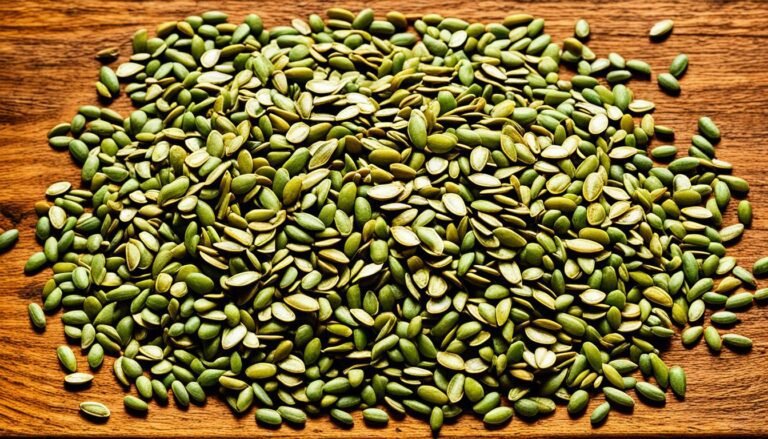Fenugreek seeds for Digestion: Natural Gut Health Support

Discover how fenugreek seeds for digestion can help ease bloating, improve gut health, and promote smoother digestion. Learn the natural benefits of this powerful seed for digestive wellness. Did you know a study showed fenugreek seed extract helps people with type 2 diabetes? This ancient herb is known for its many health benefits.
Fenugreek is full of soluble fiber, which helps with digestion and gut health. It also has compounds like 4-hydroxyisoleucine and diosgenin. These may help control blood sugar, lessen inflammation, and boost gut function.
Studies say fenugreek seeds for digestion and a natural fix for many digestive problems. It’s a great choice for anyone wanting to ease indigestion or support their gut health over time. Adding fenugreek to your wellness routine could be a smart move.
Fenugreek: A Versatile Herb with Digestive Benefits
Fenugreek has been a key herb in traditional medicine for centuries. It’s known for its digestive benefits but also has many other health perks. It can help control blood sugar and reduce inflammation, making it more than just a digestive aid.
The fiber in fenugreek seeds is great for your gut health. It slows down the digestion of carbs, making you feel full and helping with weight control. Fenugreek also has compounds like diosgenin and 4-hydroxyisoleucine that fight off inflammation and act as antioxidants.
Fenugreek has a long history, dating back to the 6th millennium B.C. near the Euphrates and Tigris rivers. Famous figures like Hippocrates and Charlemagne valued it for its healing properties. It was even grown on Charlemagne’s orders in the 8th century.
In India, fenugreek is a common ingredient in curries. It’s also packed with nutrients like proteins, fats, carbs, and minerals. These include calcium, zinc, phosphorus, manganese, and iron.
Fenugreek is a powerful herbal supplement with many benefits. It supports digestion, may help manage diabetes, and has anti-inflammatory effects. For those looking into natural remedies and fenugreek benefits for digestive support, it’s definitely worth considering.

Fenugreek and Diabetes Management
Regulating Blood Sugar Levels
Fenugreek is being studied for its role in diabetes management. Its soluble fiber slows down the absorption of carbs, leading to a more gradual rise in blood sugar levels. Compounds like 4-hydroxyisoleucine and diosgenin boost insulin production and make the body more sensitive to it, aiding in glycemic control.
Research shows that fenugreek supplements can lower fasting blood glucose, improve glucose tolerance, and reduce HbA1c levels in type 2 diabetes patients. This makes fenugreek a promising natural aid for managing diabetes.
| Metric | Fenugreek Group | Control Group | P-value |
|---|---|---|---|
| Fasting Blood Glucose (at baseline) | 154.22 ± 30.11 | 160.11 ± 28.11 | 0.231 |
| HbA1C (at baseline) | N/A | N/A | 0.441 |
| Fasting Blood Glucose (at 5 months) | 146 ± 25.80 | 155.65 ± 24.84 | 0.0421 |
| HbA1C (at 6 months) | N/A | N/A | 0.0201 |
This study’s findings show fenugreek’s potential in managing blood sugar levels and diabetes. It can help control glucose and insulin levels naturally, making it a promising option for those looking to keep blood sugar levels healthy.

Combating Digestive Discomforts
If you’re facing indigestion, bloating, or other digestive problems, fenugreek might help. This herb is full of benefits for your gut health.
Relieving Indigestion and Bloating
Fenugreek is packed with fiber and may fight inflammation. Its fiber helps with bowel movements, eases constipation, and cuts down bloating. Diosgenin in fenugreek seeds can also reduce inflammation in the gut. This can ease indigestion, gas, and stomach pain.
Research shows fenugreek can ease IBS symptoms like stomach pain, bloating, and irregular bowel movements. It targets the root causes of these issues. This makes fenugreek a natural way to better gut health and digestion.
| Digestive Benefit | Fenugreek’s Role |
|---|---|
| Reducing Indigestion | Fenugreek’s anti-inflammatory compounds can soothe gastrointestinal inflammation, alleviating symptoms of indigestion. |
| Relieving Bloating | The soluble fiber in fenugreek seeds can help regulate bowel movements and alleviate bloating. |
| Improving IBS Symptoms | Studies show fenugreek supplementation can effectively relieve abdominal pain, bloating, and irregular bowel habits associated with IBS. |
Adding fenugreek to your meals can help fight digestive issues and support your gut health.
Fenugreek and Gut Microbiota
Fenugreek is a versatile herb that may help the gut microbiome. Its seeds are high in fiber, acting as a prebiotic. This feeds the good bacteria in the gut, keeping them healthy.
Studies show that adding fenugreek to diets changes the gut microbiota. It boosts the good bacteria like Bifidobacterium and Lactobacillus. This can lead to better metabolic markers, less inflammation, and a stronger gut barrier.
Fenugreek supports a healthy gut microbiome, which is key for good digestive and metabolic health. Its prebiotic effects have been proven in many studies. This shows its potential to improve gut health and overall well-being.
| Study | Findings |
|---|---|
| Shtriker et al. (2018) | Fenugreek galactomannan and citrus pectin improved parameters associated with glucose metabolism and modulated gut microbiota in mice. |
| Antharam et al. (2016) | An integrated metabolomic and microbiome analysis associated specific gut microbiota with fecal cholesterol and coprostanol in Clostridium difficile infection. |
| Neufeld et al. (2011) | Reduced anxiety-like behavior and central neurochemical changes in germ-free mice highlights the role of gut microbiota in behavior. |
Adding fenugreek to your diet could boost your gut microbiome. This can lead to better gut health and might improve your metabolic and mental health.

fenugreek digestion
Fenugreek is a versatile herb with a long history of medicinal use. It’s known for its digestive benefits. This seed is full of soluble fiber, which is great for gut health and digestion.
The fiber in fenugreek seeds slows down the absorption of carbs. This leads to a more gradual rise in blood sugar levels. This is good for people with diabetes or those trying to control their blood sugar.
Fenugreek also has compounds that can slow down digestive enzymes. These enzymes are involved in breaking down carbs and fats. This can help manage diabetes and high cholesterol.
But there’s more to fenugreek. Its high fiber helps with regular bowel movements, eases constipation, and lessens bloating. It supports gut health in many ways.
If you want to improve your digestion, manage your blood sugar, or boost your health, try fenugreek. Adding it to your diet could be a smart move.

Fenugreek’s Fiber and Digestive Enzymes
Fenugreek is packed with soluble fiber, which affects digestion a lot. This fiber slows down carb absorption, leading to a steady rise in blood sugar. Fenugreek also has compounds that can slow down digestive enzymes. This helps with nutrient absorption and can help with diabetes and high cholesterol.
Promoting Regularity and Reducing Discomforts
The fiber in fenugreek helps with regular bowel movements, eases constipation, and reduces bloating. It helps with digestion in many ways, making it a great natural choice for gut health.
Looking to improve your digestion, manage your blood sugar, or support your health? Adding fenugreek to your diet could be a great choice.
Incorporating Fenugreek into Your Diet
Fenugreek is a versatile herb that can boost your digestive health. You can add it to your meals to improve flavor or use it as a supplement. It offers many options for your diet.
To get the most from fenugreek, use the seeds in different ways. You can eat them whole, grind them into powder, or sprout them. This adds a nutty flavor to curries, stews, and breads. For a stronger effect, try capsules, tablets, or tinctures.
The leaves of fenugreek are also great for cooking. Use them fresh or dried to make salads, stir-fries, or as a garnish. They add flavor and health benefits to your meals.
When adding fenugreek to your meals, follow the dosage instructions, especially with supplements. Talk to a healthcare professional if you have health issues or take other medicines. This ensures you use fenugreek safely and effectively.
| Fenugreek Nutrition Facts (per 1 tsp serving) | Amount |
|---|---|
| Calories | 12 |
| Total Fat | 0.2 g |
| Total Carbohydrates | 2.2 g |
| Protein | 0.9 g |
| Fiber | 0.9 g |
| Iron | 1.2 mg (7% DV) |
Adding fenugreek to your diet can support your digestive health and overall well-being. Whether you want to enhance flavor, increase nutrients, or try supplements, fenugreek has many uses. It’s a versatile herb for your culinary and dietary needs.

Exploring the Gut-Brain Connection
The gut-brain axis connects the digestive system with the central nervous system. It’s a complex network that lets them talk to each other. Research shows that the trillions of bacteria in our intestines, known as the gut microbiome, play a big role in this connection.
They affect our mental health and how well we think. This link between the gut and brain is important for our mental health.
Fenugreek’s Potential Impact on Mental Health
Fenugreek might help support mental health by changing the gut microbiome. Studies show that taking fenugreek can help with anxiety, depression, and other mental health issues. It does this by making certain substances that can reach the brain.
It also has anti-inflammatory effects that might protect the brain. This could help improve mental health.
More studies are needed, but what we know looks promising. Fenugreek might be a natural way to support mental health by focusing on the gut-brain link. It can help make the gut healthier and reduce inflammation. This could ease symptoms of anxiety and depression, leading to better mental health.
For a healthy gut-brain axis, eating well, exercising, sleeping well, and managing stress are key. Adding foods or supplements with fenugreek to your life could also help. This can be a natural way to support your gut-brain health.
Safety and Side Effects
When adding fenugreek to your diet, knowing its side effects and safety tips is key. Fenugreek is usually safe when eaten in food or taken as a supplement. But, there are some things to remember.
Gastrointestinal side effects like diarrhea, bloating, and gas might happen with high doses. People allergic to peanuts or chickpeas could react badly to fenugreek too.
Pregnant women and those with hormone-sensitive conditions should be careful. Fenugreek might affect hormones like estrogen. It could also interact with certain medications, such as blood thinners, diabetes drugs, and thyroid meds.
- Pilot studies have shown the potential benefits of fenugreek in managing blood sugar levels for type 2 diabetics.
- Research suggests fenugreek seeds may have a hypoglycemic effect and aid in glucose disposition and insulin resistance.
- One tablespoon of whole fenugreek seeds contains 35 calories, 3g of fiber, 3g of protein, 6g of carbs, and 1g of fat.
Always talk to a healthcare professional before using fenugreek, especially if you have health issues or take medicines. Knowing the safety and side effects of fenugreek helps you make smart choices for your health.
Future Research Directions
Research on fenugreek’s health benefits is growing, opening up new areas to explore. Scientists want to learn more about how fenugreek affects the gut microbiome. They’re looking into how this affects gut health, diabetes management, and mental health.
Studying the gut-derived metabolites from fenugreek could reveal important insights. We also need more clinical trials to see if fenugreek helps with digestive issues, diabetes, and mental health. As we learn more about the gut-brain axis, fenugreek could become a key natural treatment for health.
Since most people worldwide use natural products for health, studying fenugreek research is promising. By understanding how fenugreek interacts with our gut and health, we can find new ways to improve wellness naturally.
| Research Area | Potential Focus |
|---|---|
| Gut Microbiome | Investigating the specific gut-derived metabolites produced from fenugreek consumption and their effects on physiological and neurological processes. |
| Clinical Trials | Conducting more comprehensive clinical trials to establish the efficacy of fenugreek in managing digestive disorders, diabetes, and mental health conditions. |
| Gut-Brain Axis | Exploring the potential applications of fenugreek as a natural therapeutic option for supporting both physical and mental wellbeing. |
Conclusion
Fenugreek is a powerful herb with a long history in traditional medicine. It’s great for gut health and digestive well-being. Its soluble fiber, anti-inflammatory compounds, and prebiotic effects help with many digestive issues.
These issues include regulating blood sugar, easing indigestion, and reducing bloating. By changing the gut microbiome and affecting the gut-brain axis, fenugreek might also help with mental health. More studies are needed, but the current evidence shows it’s a valuable natural remedy.
Adding fenugreek to your diet is easy with seeds, leaves, or extracts. It’s a simple way to improve gut health, manage blood sugar, or enhance digestion. Fenugreek could be a natural solution you should consider.
FAQ
What are the digestive benefits of fenugreek?
Fenugreek is full of soluble fiber, which helps with digestion and keeps the gut healthy. It has compounds like 4-hydroxyisoleucine and diosgenin. These may help control blood sugar, reduce inflammation, and improve gut health.
How is fenugreek a versatile herb with various health benefits?
Fenugreek is not just good for digestion. It’s also studied for managing diabetes, lowering cholesterol, and fighting inflammation. The fiber in its seeds can slow down carb absorption and make you feel full. This can help with weight management.
How can fenugreek help manage diabetes?
The fiber in fenugreek seeds slows down carb absorption, which helps control blood sugar levels. Compounds like 4-hydroxyisoleucine and diosgenin boost insulin production and make the body more sensitive to insulin. This helps with diabetes management.
How can fenugreek help with digestive discomforts?
Fenugreek’s fiber and anti-inflammatory properties make it great for digestive issues. The fiber helps with bowel movements, eases constipation, and reduces bloating. Diosgenin can also soothe inflammation in the gut.
How does fenugreek impact the gut microbiome?
Fenugreek seeds are a prebiotic, feeding good bacteria in the gut and keeping the balance right. Studies show that fenugreek can change the gut microbiota. It increases the good bacteria.
How does fenugreek’s fiber and compounds affect digestion?
The soluble fiber in fenugreek slows down carb absorption, helping to control blood sugar levels. It also has compounds like galactomannans and diosgenin. These can slow down digestive enzymes, helping with diabetes and high cholesterol.
How can you incorporate fenugreek into your diet?
You can add fenugreek to many dishes and supplements. Use the seeds whole, ground, or sprouted in curries, stews, and breads. Fenugreek leaves can be eaten fresh or dried. Capsules, tablets, or tinctures are also available.
How can fenugreek affect mental health through the gut-brain connection?
Research shows that fenugreek can help with mental health by changing the gut microbiome. It can improve anxiety, depression, and other mental health issues. This is because gut bacteria produce metabolites that affect the brain.
What are the potential side effects and contraindications of fenugreek?
Fenugreek is usually safe but can cause stomach issues like diarrhea, bloating, and gas with high doses. People allergic to peanuts or chickpeas might react badly to it. Pregnant women and those with hormone-sensitive conditions should be careful. It might also interact with some medicines.
What are some future research directions for fenugreek?
Researchers want to learn more about how fenugreek affects the gut microbiome and improves health. They’re looking into specific gut bacteria and their effects on the body and brain. More studies are needed to prove fenugreek’s benefits for digestive and mental health.






